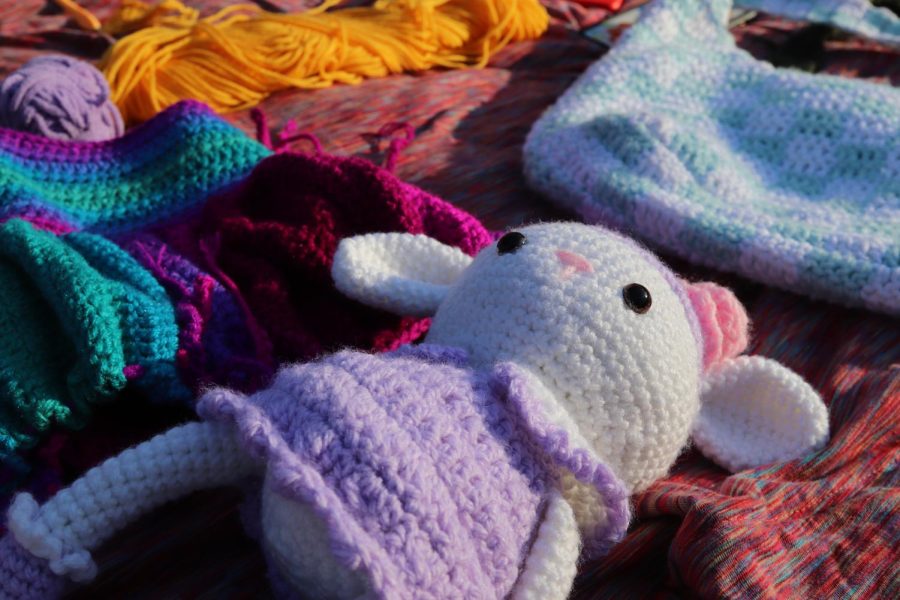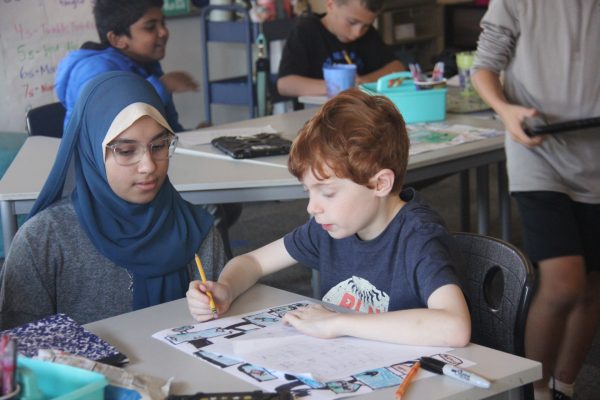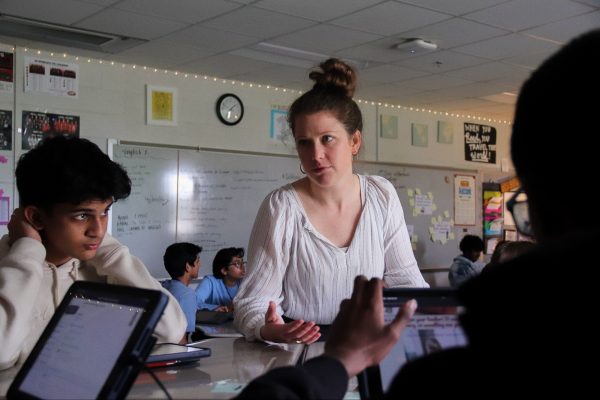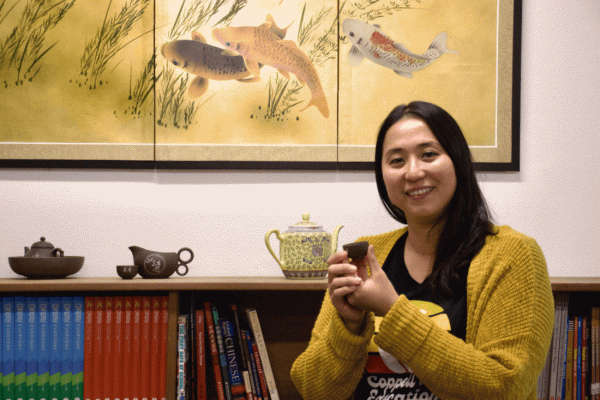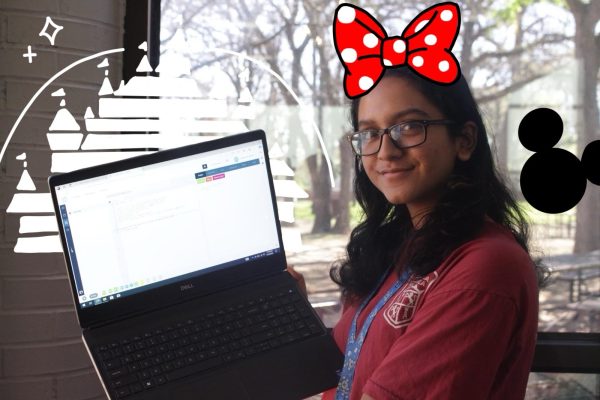Anupindi, Aguirre-Jimenez sewing strings together
Pair pulling threads to crochet business
Finding Coppell High School juniors Ananya Anupindi and Julieta Aguirre-Jimenez within a crowd wouldn’t be hard. The pair’s prominence is not just because of their expressive smiles on a Saturday afternoon or their identical blue-jean-black-converse outfits.
Slung on their arms are two crocheted bags, entirely handmade.
We sit down at a table at the Coppell Farmers Market, where just two months ago Anupindi and Aguirre-Jimenez were selling their products. The idea for AJ Crochet Shop, inspired by the initials of Anupindi and Aguirre-Jimenez, started more than a year ago.
“During sophomore year, my mom’s friends came over to my house one day,” Anupindi said. “They were talking to my mom. And my mom always keeps my work out for everyone to see. I made my first sale then. I sold two plants and a bag, and I made $50 from that. I was like this is insane.”
As they gingerly pull out crocheted projects from their hand-made bags (two pastel plush sheep, a snowman, a mushroom jewelry organizer, a blouse and some trinkets from their fall and winter sale), I catch myself smiling, growing as they take each piece out.
Aguirre-Jimenez tells me about one of the first things she crocheted: a pink sheep. She jokes about her progress, and it is clear that each of these pieces hold sentimental value to them, crafted with love and time. Crocheting had always been a refuge of recreation for both Aguirre-Jimenez and Anupindi.
“I went to field day, and they were passing out these dollar crochet kits,” Aguirre-Jimenez said. “I was like ‘I can do this.’ I read the manual, and even though it came out wonky, I could see a pattern forming. After a couple months, I started looking at tutorials, which helped me form simple patterns and piqued my interest.”
It was Aguirre-Jimenez’s knowledge in crocheting that would serve as the fuel to Anupindi’s eventual liking of the hobby.
“One time [Anupindi] was like ‘you have to show me how to crochet,’” Aguirre-Jimenez said. “[Teaching crocheting] was really important to me because I don’t know anybody else in my personal life who crochets. I wanted to share it with her, and I remember FaceTiming her during quarantine at 8 p.m. It was really cool how she understood it so quickly even though we weren’t in-person.”
But Aguirre-Jimenez’s lessons, as Anupindi explains, served a deeper purpose than just learning crocheting. Crocheting became an outlet for Anupindi to cope with the tumultuous timing of COVID-19.
“The pandemic was pretty awful, and I was not in a good place,” Anupindi said. “Middle school had not been a great experience. I moved to Coppell in eighth grade from Universal Academy. Right before that, I was in India. I didn’t have many friends going into the pandemic. But, I did have Julieta. She told me how she crocheted, and I started using it as a way to cope with the loneliness. Crocheting was a good thing to have during COVID-19 because it didn’t make me feel as alone as I did before. I didn’t have many friends going into the pandemic. But, I did have Julieta. She told me how she crocheted, and I started using it as a way to cope with the loneliness. Crocheting was a good thing to have during COVID-19 because it didn’t make me feel as alone as I did before. — Ananya Anupindi
At one point, Anupindi and Aguirre-Jimenez pull out their needles, and I sense that crochet comes as intuitively to them as blinking does to me. A crucial characteristic of crochet culture, as I’ll later learn, is crocheting upon every second of free time.
Due to the time intensive process of crocheting in bulk for a sale, Anupindi and Aguirre-Jimenez host three sales a year at the Coppell Farmers Market, during the summer, fall and winter. The tri-annual sale helps the duo maintain a school-business balance while simultaneously devoting quality time to crocheting their next batch of products.
“In the beginning, we wanted to build a brand, but as young entrepreneurs, we wanted to keep the business homemade,” Aguirre-Jimenez said. “We decided to start small in Coppell, and it was nice. We can only go three times a year, but we keep up with school work. And when we’re off of school, we just crochet, crochet, crochet.”
Although the pair faced some initial setbacks in creating the business, such as understanding the different gauge (loop) sizes of each other, planning a process helped the two make each sale more effective.
“Before we start working, we make a giant document of different ideas from Pinterest, websites or YouTube,” Aguirre-Jimenez said. “From there, we select what would be the most convenient and cute.”
Although capitalizing off of her passion has made crocheting more stressful, it remains just as fulfilling for Anupindi as ever.
“When you start thinking of crocheting as a deadline, it’s not a hobby anymore,” Anupindi said. “It’s a job. It does still help me destress, and although it’s not as relaxing as it used to be, it’s definitely still my passion.”
As I talk to Anupindi a couple days later, I am not surprised to see her yet again with two needles in hand, at the advent of a new project. But this time, it’s not crocheting.
“There’s this girl in my AP Biology class,” Anupindi said. “And she just started bringing yarn and knitting in class. And I said ‘can I try’ because I’ve never tried knitting before. Every time there’s something new, I try to grasp onto it. Right now, I’m trying to knit a scarf, which is just a long rectangle. It’s a lot more stress-relieving [than crocheting], but I don’t know how to fix my stitches if I mess them up. But, it’s so slow.”
Anupindi’s hands, which were once occupied with needles, become expressive as she tells me about the intricacies of knitting. As terrible as I know I would be, Anupindi’s passion makes me feel a sudden urge to crochet. It is seemingly apparent that crocheting and knitting are two things that Anupindi has a penchant for, both to physically do and inspire others to do. That is why Anupindi and Aguirre-Jimenez prospect to expand their crocheting platform to become an organization to help middle schoolers learn how to sew and sell at the Dallas Farmers Market.
“The Dallas Farmers Market has the most beautiful art pieces,” Anupindi said. “People are willing to spend on art. Over here, most people want to get their tomatoes. We’re thinking of expanding into the Dallas Farmers Market this summer. But we’re also thinking about starting our organization with middle schoolers.”
Apart from being an avenue for revenue, Anupindi uses crocheting as a means of giftmaking, gifting CHS English teacher Stephanie Spaete an ornament for Christmas.
“[Anupindi] had told me a while ago that she crochets and sells at the farmers market,” Spaete said. “She said she’ll make something, but I was really excited to get the ornament because it was well-thought and special that she considered me. I tell her all the time that I’m impressed [with] anyone who can sit that long and maintain focus. It’s inspiring.”
As I leave, I see Anupindi begin to knit again. And something tells me she won’t be stopping for a while.
Follow Anushree De (@anushree_night) and @CHSCampusNews on Twitter.

Anushree De is a senior and the features editor of The Sidekick, where their passion for storytelling flourishes. Their favorite films, La La Land, Zootopia,...




